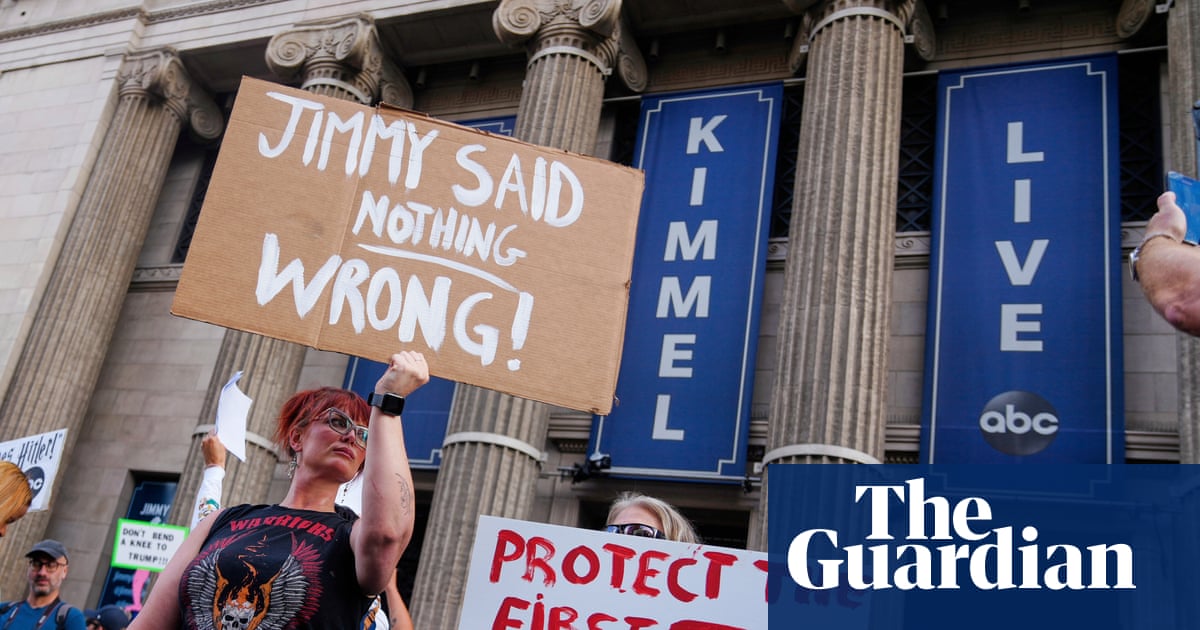In the theatrical tactic “breaking the fourth wall”, characters acknowledge the presence of the audience. As when, in the current National Theatre production of Stephen Sondheim’s final musical, Here We Are, the performers, walking forward, stop in shock at seeing a big room full of strangers.
The director Jamie Lloyd, though, is pioneering a technique that might be called breaking the theatre wall. In his revival of Evita, previewing at the London Palladium, Rachel Zegler’s Eva Perón sings Don’t Cry For Me Argentina – supposedly delivered from the Casa Rosada presidential balcony in Buenos Aires – from the balcony outside the Palladium, while the audience inside has to settle for a video feed.
Last year, at London’s Savoy theatre, Lloyd staged the title number of another Andrew Lloyd Webber musical, Sunset Boulevard, with Tom Francis delivering the song while walking up the stairs from his dressing room out on to the Strand and then back down into the theatre, all filmed by a backwards-moving camera operator capturing live images shown on a screen to theatregoers. Since the Olivier-winning production became Tony winning on Broadway, Francis has been doing a version of the route in and out of the St James theatre along West 44th Street.
Both staging stunts prompted social media complaints about shelling out big money (top tickets are around £200) to find the night’s big numbers are being sung to passersby for free. There is artistic loss, too. The anthemic, dramatic titular song in Sunset Boulevard features lyrics, from Don Black and Christopher Hampton, that are among the most effective, except those by Tim Rice, that Lloyd Webber has ever worked with. Joe Gillis, a Hollywood chancer who has run out of money, sings of Norma Desmond, whose career has stalled: “She was sinking fast, I threw a rope / Now I have suits and she has hope / It seemed an elegant solution.”
This number, starting the second act, is a show highlight. But, in Lloyd’s production, the tight writing and explosive orchestration were, for me, lost in the jeopardy of the gimmick, as the audience – and, it seemed to me, Francis – fretted that he might fall down the steps, crash into the camera, be accosted by a reveller or police officer, or electrocuted if rain drenched his microphone. (Should Manhattan be hit by wilder weather, a route inside the building has been mapped, according to the New York Times, though not yet used.)
The question is what explosion of the venue adds theatrically. Perón’s hold over the Argentinian populace depended to a significant degree on her being Catholic – the musical is very strong on the Buenos Aires first lady’s co-option of the scriptural Madonna that the secular Madonna later played in the movie version – and their being poor and living under military dictatorship. These days, poverty will regrettably be well represented on the streets of London, though relevant faith and tyranny less so. Does a dead fascist singing to tourists and boozers enhance or distract from the action of Evita?
When the Belgian director Ivo Van Hove staged Opening Night last year at the Gielgud, Sheridan Smith, playing a boozy, unreliable actor, was nightly seen outside on Shaftesbury Avenue and beamed to screens inside, staggering drunk from a limo to the stage door. This worked dramatically – because the external scene was in character – and gained useful publicity, although not enough to prevent the flawed show closing early.

Less seems gained from throwing musicals out on to the street. Relevantly, Hampton, co-librettist of Sunset Boulevard, also wrote a solo play, Tales From Hollywood, about eastern European émigrés in the California movie business, in which characters include Austro-Hungarian writer Ödön von Horváth and German dramatist Bertolt Brecht, who demonstrates his theatrical technique of “alienation”, drawing attention to the lighting or frequently breaking the fourth wall in other ways. Von Horváth says: “Brecht always liked people to be aware they were in a theatre. I said to him more than once, ‘But Brecht, what makes you think they think they’re anywhere else?’”
A good question, which Lloyd intensifies by putting the singers somewhere else. By following Sunset Boulevard with Evita, he has now staged two of Lloyd Webber’s best-known shows. Logically, the next might be Jesus Christ Superstar. And, if he continues his signature of street theatre, then logically the title character will be crucified outside, looking across from his West End Calvary towards department stores and fast-food joints.
That may raise questions for whoever is archbishop of Canterbury by then, but also for theatre audiences. Just as the fourth wall should only be breached for very good narrative reasons, people who have paid a lot of money to sit in a theatre may reasonably expect that the most important songs in a musical will be sung in front of them.

 3 months ago
122
3 months ago
122

















































